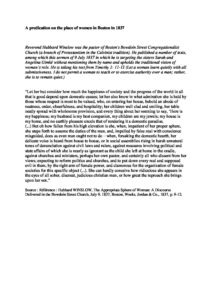Reverend Hubbard Winslow was the pastor of Boston’s Bowdoin Street Congregationalist Church (a branch of Protestantism in the Calvinist tradition). He published a number of texts, among which this sermon of 9 July 1837 in which he is targeting the sisters Sarah and Angelina Gimké without mentioning them by name and upholds the traditional vision of woman’s role. He is taking his text from Timothy 2: 11-12 (Let a woman learn quietly with all submissiveness. I do not permit a woman to teach or to exercise authority over a man; rather, she is to remain quiet.)
“Let her but consider how much the happiness of society and the progress of the world in all that is good depend upon domestic causes; let her also know in what admiration she is held by those whose respect is most to be valued, who, on entering her house, behold an abode of neatness, order, cheerfulness, and hospitality; her children well clad and smiling, her table neatly spread with wholesome provision, and every thing about her seeming to say, ‘Here is my happiness; my husband is my best companion, my children are my jewels; my house is my home, and no earthly pleasure excels that of rendering it a domestic paradise.
(…) But oh how fallen from his high elevation is she, when, impatient of her proper sphere, she steps forth to assume the duties of the man, and, impelled by false zeal with conscience misguided, does as even man ought not to do – when, forsaking the domestic hearth, her delicate voice is heard from house to house, or in social assemblies rising in harsh unnatural tones of denunciation against civil laws and rulers, against measures involving political and state affairs of which she is nearly as ignorant as the child she left at home in the cradle, against churches and ministers, perhaps her own pastor, and certainly all who dissent from her views; expecting to reform politics and churches, and to put down every real and supposed evil in them, by the right arm of female power, and clamorous for the organization of female societies for this specific object (…). She can hardly conceive how ridiculous she appears in the eyes of all sober, discreet, judicious christian men, or how great the reproach she brings upon her sex.”
